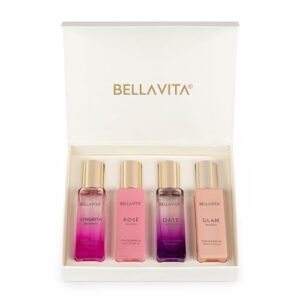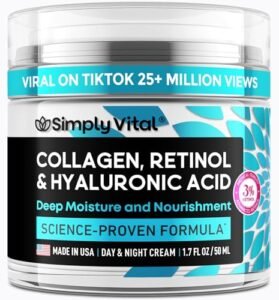Face Renewal Oil vs. Face Cream
In the ever-evolving world of skincare, the quest for a radiant and youthful complexion often leads us to explore a myriad of products. Among the most debated are face renewal oils and face creams—two popular contenders in the realm of skin rejuvenation. As we all strive for that healthy glow, it’s natural to feel overwhelmed by the plethora of options available and to wonder which product best suits our skin’s unique needs. This blog post aims to compare face renewal oil and face cream, delving into their benefits, ingredients, and application techniques. By the end, you’ll be better equipped to make an informed choice that will enhance your skincare routine and support your journey to glowing skin. Let’s discover which option may be the key to unlocking your best face yet!
What is Face Renewal Oil?
Face Renewal Oil is a specialized skincare product designed to rejuvenate, hydrate, and enhance the overall health of your skin. It consists of a blend of various natural oils, essential oils, vitamins, and antioxidants, carefully formulated to target common skin concerns such as dryness, uneven texture, and dullness.
Composition of Face Renewal Oil
The composition of Face Renewal Oil typically includes a combination of:
- Carrier Oils: These form the base of the oil, providing hydration and nourishment. Common examples include:
- Jojoba Oil: Mimics the skin’s natural sebum, making it suitable for all skin types.
- Argan Oil: Rich in fatty acids and vitamin E, known for its moisturizing properties.
- Rosehip Oil: High in essential fatty acids and antioxidants, beneficial for healing and rejuvenating the skin.
- Essential Oils: Added for their therapeutic properties and delightful scents. Examples include:
- Lavender Oil: Soothing and anti-inflammatory, great for sensitive skin.
- Tea Tree Oil: Antimicrobial and anti-inflammatory, ideal for acne-prone skin.
- Frankincense Oil: Renowned for its anti-aging benefits and skin toning properties.
- Vitamins: Essential for skin repair and nourishment, often found in face oils:
- Vitamin C: Brightens and evens out skin tone while boosting collagen production.
- Vitamin E: Acts as a powerful antioxidant, protecting the skin from damage.
- Antioxidants: Key ingredients that combat free radicals and promote skin health. Common ones include:
- Coenzyme Q10: Helps reduce the appearance of fine lines and wrinkles.
- Green Tea Extract: Rich in polyphenols, known for its anti-aging benefits.
Primary Functions of Face Renewal Oil
Face Renewal Oil serves multiple functions that are essential for maintaining healthy skin:
- Hydration: Provides an additional moisture layer, helping to lock in water and prevent dryness.
- Nourishment: Delivers vitamins and fatty acids that feed the skin, promoting repair and regeneration.
- Radiant Complexion: With continued use, the oil improves skin texture and tone, leaving a luminous look.
- Protective Barrier: Acts as a shield against environmental stressors, helping to keep your skin healthy and youthful.
Benefits of Using Face Oil
Incorporating Face Renewal Oil into your skincare routine can bring numerous benefits:
- Deep Hydration: Unlike traditional creams, oils penetrate deeper to provide lasting moisture.
- Improved Skin Texture: Reduces rough patches and the appearance of pores, promoting a smoother skin surface.
- Enhanced Nutrient Absorption: Face oils can boost the effectiveness of serums and creams used subsequently.
- Balancing Oil Production: Even oily skin types can benefit as oils can signal the skin to balance oil production naturally.
Bullet Points: Key Benefits of Face Renewal Oil
- Deeply hydrates and nourishes the skin
- Helps even skin tone for a brighter complexion
- Provides antioxidants that protect against environmental damage
- Aids in reducing the appearance of fine lines and wrinkles
- Suitable for various skin types, including dry, oily, and combination skin
Best Faces Oils for Various Skin Types
To choose the right Face Renewal Oil tailored to your needs, consider the following recommendations for different skin types:
| Skin Type | Recommended Face Oils | Specific Products |
|---|---|---|
| Dry Skin | Argan Oil, Rosehip Oil | The Ordinary 100% Organic Cold Pressed Rose Hip Seed Oil |
| Oily Skin | Jojoba Oil, Tea Tree Oil | Biossance Squalane + Tea Tree Balancing Oil |
| Combination Skin | Marula Oil, Grapeseed Oil | Drunk Elephant Virgin Marula Luxury Facial Oil |
| Sensitive Skin | Lavender Oil, Chamomile Oil | Herbivore Botanicals Phoenix Facial Oil |
| Mature Skin | Pomegranate Oil, Frankincense Oil | Sunday Riley Luna Sleeping Night Oil |
By selecting a Face Renewal Oil suited to your skin type and specific needs, you can unlock the full potential of your skincare routine, ensuring that your skin looks and feels its best every day.
What is Face Cream?
Face cream is a specialized skincare product designed to hydrate, nourish, and protect the skin on your face. It serves multiple purposes based on its formulation and the specific ingredients it contains. As a fundamental part of many people’s skincare routines, understanding what face cream is and how it works is crucial for maintaining healthy, glowing skin.
Formulation of Face Cream
Face creams are typically emulsion-based products that combine water and oils to deliver hydration and nutrients to the skin. They may include a variety of ingredients that cater to different skin types and concerns. The overall formulation can vary widely, but face creams generally fall into two categories: water-based and oil-based.
Common Active Ingredients
The potency of face creams largely depends on their active ingredients. Some of the most effective and popular ingredients include:
- Hyaluronic Acid: A powerful humectant known for its ability to hold over 1,000 times its weight in water, making it a key player in skin hydration. For example, Neutrogena Hydro Boost Water Gel is a lightweight face cream that harnesses the power of hyaluronic acid to deliver intense moisture.
- Peptides: These are small chains of amino acids that can stimulate collagen production and improve skin elasticity. Products like The Ordinary “Buffet” Multi-Technology Peptide Serum help support skin structure and reduce signs of aging.
- Emollients: Ingredients like shea butter and jojoba oil are common in face creams to soften the skin and provide a barrier that helps retain moisture. CeraVe Moisturizing Cream contains emollients and ceramides to restore and protect the skin barrier.
Intended Purposes
The primary purposes of face cream include:
- Moisture: Providing hydration to keep the skin plump and radiant.
- Skin Barrier Support: Ingredients like ceramides and fatty acids help enhance the skin’s natural barrier, preventing moisture loss and protecting against environmental stressors.
- Anti-Aging: Many face creams include antioxidants (like vitamin C) and peptides that can help reduce the appearance of fine lines and wrinkles.
Benefits of Using Face Creams
- Enhanced Hydration: Regular use of face cream helps maintain moisture levels for a more youthful appearance.
- Boosted Skin Protection: A well-formulated face cream can protect against pollution and UV damage.
- Targeted Treatments: Different face creams can address specific skin concerns, from dryness to sensitivity and aging.
Types of Face Creams
Face creams come in various types to suit different needs and routines, particularly during the day and night.
1. Day Creams
Day creams are typically lighter and often include SPF for sun protection. These creams are formulated to keep the skin hydrated throughout the day while providing additional benefits without clogging pores. For example, Clinique Moisture Surge 72-Hour Auto-Replenishing Hydrator is a popular day cream that provides moisture and leaves the skin looking radiant.
2. Night Creams
Night creams are usually richer and thicker, designed to support skin repair and regeneration during sleep. They often contain potent ingredients like retinol or niacinamide to target aging signs. An example is Olay Regenerist Retinol 24 Night Moisturizer, which combines retinol and niacinamide to improve the texture and firmness of the skin while you sleep.
3. Targeted Formulations
Some face creams target specific skin issues, such as:
- Acne-Prone Skin: Products like La Roche-Posay Effaclar Mat Face Moisturizer help control oil and reduce the appearance of blemishes.
- Sensitive Skin: Vichy Aqualia Thermal Rich Cream is formulated for sensitive skin, providing soothing hydration without irritation.
- Anti-Aging: Drunk Elephant Lala Retro Whipped Cream is designed to provide intense moisture while combating the signs of aging.
| Type of Face Cream | Key Features | Example Product |
|---|---|---|
| Day Cream | Lightweight, often with SPF | Clinique Moisture Surge |
| Night Cream | Rich, reparative ingredients | Olay Regenerist Retinol 24 |
| Acne-Prone | Oil control, blemish-fighting | La Roche-Posay Effaclar Mat |
| Sensitive Skin | Soothing, gentle ingredients | Vichy Aqualia Thermal |
| Anti-Aging | Collagen-boosting, potent actives | Drunk Elephant Lala Retro |
With a better understanding of face creams and their functionalities, you can explore different options to find the one that suits your skin type and addresses your individual skincare concerns effectively.
Comparison of Benefits: Face Renewal Oil vs. Face Cream
When it comes to skincare, the debate between using face oils and face creams can be quite intense. Each product has its unique set of benefits, and understanding these distinctions is essential for choosing the right product for your skin type and concerns. Below is a detailed side-by-side comparison of Face Renewal Oil and Face Cream, considering several key aspects.
Absorption Rates
Face Renewal Oils:
- Quick Absorption: Face oils, such as The Ordinary 100% Organic Cold Pressed Rose Hip Seed Oil, are known for their rapid absorption. They penetrate deeper into the skin due to the smaller molecular size of oil particles.
- Less Residue: Many users report a non-greasy feeling after using face oils, as they often leave little to no residue.
Face Creams:
- Gradual Absorption: Creams, like Neutrogena Hydro Boost Gel-Cream, tend to absorb more gradually. They form a protective barrier on the skin, which slowly releases hydration.
- Long-Lasting Moisture: Due to their emollient properties, face creams can keep skin hydrated for longer periods, making them suitable for dry or dehydrated skin types.
Hydration Levels
Face Renewal Oils:
- Intense Nourishment: Oils usually provide deeper nourishment. Products like Sunday Riley Luna Sleeping Night Oil can address dry patches and lock in moisture.
- Skin Barrier Support: Oils can strengthen the skin barrier, which helps prevent moisture loss.
Face Creams:
- Hydration Balance: Creams like Clinique Moisture Surge have hydrating ingredients such as hyaluronic acid, providing hydration that feels fresh and long-lasting.
- Water-Based Formulas: Many face creams are water-based, offering a lighter feel that is often more suitable for daytime use.
Suitability for Different Skin Types
Face Renewal Oils:
- Oily Skin Warning: Contrary to some assumptions, certain oils can be beneficial for oily skin. For instance, Jojoba Oil mimics the skin’s natural oils, helping regulate oil production. However, caution is advised as heavier oils like Coconut Oil might clog pores for those prone to acne.
- Dry/Sensitive Skin: Face oils are ideal for dry, sensitive skin types needing extra moisture. Tarte Maracuja Oil is perfect for revitalizing tired skin.
Face Creams:
- Universal Application: Creams are generally more suitable for all skin types because they can incorporate various active ingredients tailored for specific concerns, such as acne, aging, or sun protection.
- Combination Skin: Lightweight creams, such as CeraVe Daily Moisturizing Lotion, are often recommended for combination skin, providing balanced hydration without excess oil.
Long-Term Effects
Face Renewal Oils:
- Regenerative Benefits: Over time, using oils can lead to improved skin texture and elasticity. An example is Kiehl’s Midnight Recovery Concentrate, which has been noted for its long-term brightening and plumping effects.
- Enhanced Glow: Users often report a more radiant complexion when incorporating oil into their routine.
Face Creams:
- Anti-Aging Formulas: Many face creams, like Olay Regenerist Micro-Sculpting Cream, are formulated with anti-aging ingredients such as peptides and retinol, making them effective for long-term skin rejuvenation.
- Protection: Creams often contain SPF or antioxidants, which help protect against sun damage and environmental stressors.
Potential Drawbacks
Face Renewal Oils:
- Risk of Breakouts: Users with acne-prone skin may find that certain oils exacerbate their conditions. It’s essential to choose non-comedogenic options, like Argan Oil.
- Limited Functionality: While oils offer hydration, they typically lack additional benefits like sun protection or exfoliating properties.
Face Creams:
- Heavy Formulations: Some creams can feel heavy or greasy, especially for those with oily skin. Individuals might prefer lighter gel creams, such as Biotherm Aqua Bounce Gel, which offer hydration without the weight.
- Sensitivity to Ingredients: Creams containing preservatives or fragrances might irritate sensitive skin types, emphasizing the importance of patch testing before use.
In Summary: Direct Comparison Table
| Aspect | Face Renewal Oil | Face Cream |
|---|---|---|
| Absorption Rate | Quick absorption, less residue | Gradual absorption, long-lasting moisture |
| Hydration Levels | Deep nourishment, strengthens barrier | Balanced hydration, water-based formulas |
| Suitability | Good for dry/sensitive skin; cautious for oily skin | Universal, tailored for all skin types |
| Long-Term Effects | Improves texture and glow | Anti-aging benefits, protection against damage |
| Potential Drawbacks | Risk of breakouts, limited functionality | Might feel heavy, possible ingredient sensitivity |
This comparison illustrates that both face renewal oils and face creams have unique benefits and are vital for different skincare routines. Depending on your skin needs, you can choose one over the other or even incorporate both for a more comprehensive skincare approach.
Making the Right Choice for Your Skin
In conclusion, both Face Renewal Oil and Face Cream offer unique benefits tailored to different skin types and concerns. Face oils deliver deep nourishment and hydration, making them ideal for dry or mature skin, while face creams often provide a lighter texture that caters to oily or combination skin, along with essential moisture and protection. Ultimately, the best choice depends on your individual skin needs and preferences. We encourage readers to experiment with both options to determine which product aligns best with their skincare routine, allowing for a personalized approach to achieving healthy, radiant skin.
18 Comments
Comments are closed.






Just curious, how do you feel about mixing oils with creams? I sometimes do that for added hydration but I’m not sure if it’s effective.
Mixing oils with creams can definitely enhance hydration! Just be mindful of how your skin reacts. It can be a great way to customize your routine!
I always thought face oil was just for dry skin, but it sounds like it can benefit all skin types! Has anyone tried the Sunday Riley Juno Oil? I’d love to hear your thoughts!
I’ve been hearing mixed reviews about retinol face creams. Do you think they should be compared with face oils that contain natural ingredients? What are your thoughts?
Retinol and natural oils can serve different purposes. While retinol is great for anti-aging, oils nourish and hydrate. It’s a valid debate, and I’ll consider exploring this in more detail!
I’d love to see an article on skincare routines that incorporate both oils and creams for different skin types. That would be super helpful!
That’s a fantastic idea! I’ll definitely consider writing about tailored skincare routines that use both products for various skin types.
Great article! I’ve noticed that face oils can sometimes make my makeup slide off. Any tips on how to use them without ruining my makeup?
That’s a common concern! Try applying face oil at least 10-15 minutes before makeup, or mix a drop into your foundation for a dewy finish. Thanks for the suggestion!
Can you recommend a good face cream for sensitive skin? I’ve been struggling to find one that doesn’t irritate me!
For sensitive skin, I recommend checking out Cetaphil’s Daily Hydrating Lotion. It’s gentle and hydrating. Hope that helps!
I’ve seen a lot of influencers rave about face oils for glowing skin. Do you think there’s a specific ingredient in them that really makes a difference?
Many face oils contain essential fatty acids and antioxidants, which help with skin radiance. I might delve into specific ingredients in a future post!
Can you expand on how face creams might be more beneficial during winter months? I feel like my skin gets so dry and needs the extra moisture.
Great point! Face creams often create a barrier to lock in moisture, which can be really helpful in the winter. I’ll definitely consider diving deeper into seasonal skincare in a future article!
I love using face oils at night, especially the Josie Maran Argan Oil. It makes my skin feel so soft! Anyone else have a favorite oil they swear by?
Josie Maran’s Argan Oil is a favorite for many! It’s amazing how soft it leaves your skin. Would love to hear more favorites from others too!
Absolutely! Face oils can indeed provide benefits for all skin types. Sunday Riley Juno Oil is quite popular for its nourishing properties, so I’d love to hear others’ experiences too!